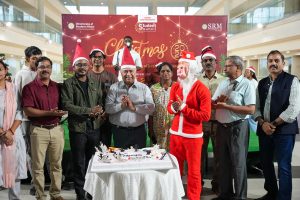All Management Events
- Enhancing Teaching Practices with Prof. Conrad December 31, 2024
 The Teaching Learning Centre successfully conducted a two-day workshop on Project-Based Learning (PBL). The workshop, designed to equip educators with innovative teaching methodologies, brought together 64 faculty members from various disciplines to explore the transformative potential of PBL in higher education.
The Teaching Learning Centre successfully conducted a two-day workshop on Project-Based Learning (PBL). The workshop, designed to equip educators with innovative teaching methodologies, brought together 64 faculty members from various disciplines to explore the transformative potential of PBL in higher education.The workshop was led by Prof. James M. Conrad, a distinguished academic from the University of North Carolina at Charlotte, USA Prof. Conrad, who serves as the Associate Chair of Undergraduate Programs in the Department of Electrical and Computer Engineering, shared his extensive expertise in Computer Engineering, Embedded Systems, and Robotics. His sessions provided a comprehensive understanding of how PBL can foster critical thinking, collaboration, and real-world problem-solving skills among students.
The event began with an introduction to the core principles of PBL, emphasising its alignment with curriculum objectives and its role in creating meaningful, student-centered learning experiences. Participants engaged in interactive sessions that included hands-on activities and group discussions. These activities were designed to help faculty design effective PBL frameworks, manage group dynamics, and assess student progress through formative and summative evaluation methods.
A key highlight of the workshop was the integration of technology and collaborative tools into the PBL process. Faculty members explored various platforms that enhance student engagement and project outcomes, making PBL adaptable to diverse academic disciplines. Practical exercises provided participants with actionable strategies to implement PBL in their classrooms.
By the end of the workshop, participants expressed their enthusiasm and confidence in adopting PBL methodologies. The faculty gained valuable insights into fostering an interactive and innovative learning environment that prepares students for real-world challenges. The workshop was widely appreciated for its practical approach and the relevance of its content to modern educational needs.
Continue reading → - TLC Facilitates Workshop for PhD Scholars December 31, 2024
 The Teaching Learning Centre conducted a one-day workshop on innovative teaching methods, designed exclusively for PhD Scholars. The event saw the participation of 40 scholars from various departments who sought to enhance their teaching and research capabilities through advanced pedagogical techniques.
The Teaching Learning Centre conducted a one-day workshop on innovative teaching methods, designed exclusively for PhD Scholars. The event saw the participation of 40 scholars from various departments who sought to enhance their teaching and research capabilities through advanced pedagogical techniques.The workshop was led by Prof. James M Conrad, a renowned academic and expert in embedded systems, robotics, and modern teaching methodologies. With his extensive academic experience and leadership roles, including contributions to IEEE, Prof. Conrad brought a global perspective to the session. He guided the participants through strategies to foster student engagement, manage diverse learning needs, and incorporate innovative approaches into classroom and laboratory settings.
The workshop focused on equipping scholars with practical skills to create engaging and inclusive learning environments. Participants explored the use of digital platforms and modern educational technologies to enhance teaching effectiveness and improve student outcomes. Interactive discussions and hands-on activities encouraged scholars to exchange ideas, collaborate, and develop tailored teaching strategies that meet the needs of diverse learners.
By the end of the session, the scholars gained confidence in applying innovative, student-centered methodologies. They felt empowered to contribute significantly to the quality of education and learning outcomes at their respective institutions. This training not only prepared them for their roles as Teaching Assistants (TAs) but also equipped them with the tools to excel as future educators and researchers.
The workshop exemplifies SRM AP’s commitment to fostering excellence in education through innovative training programmes. It highlighted the university’s dedication to preparing scholars for the evolving challenges of academia, ensuring they are equipped to create impactful learning experiences.





Continue reading → - Christmas Festivities on Campus December 31, 2024
 The spirit of Christmas illuminated the campus as students, faculty, and staff gathered to celebrate the festive season with joy and camaraderie. This year’s Christmas celebration, jointly organised by the Directorate of Student Affairs and the Directorate of Human Resource Development, was a spectacular event that showcased the true essence of the unity in diversity.
The spirit of Christmas illuminated the campus as students, faculty, and staff gathered to celebrate the festive season with joy and camaraderie. This year’s Christmas celebration, jointly organised by the Directorate of Student Affairs and the Directorate of Human Resource Development, was a spectacular event that showcased the true essence of the unity in diversity.The celebration witnessed enthusiastic participation from the university’s leadership, including the Vice Chancellor, Registrar, Deans of schools, faculty and staff members. Their presence added warmth and inspiration to the festive occasion.
The event was particularly memorable due to the vibrant involvement of international students, the games, performances, and other activities highlighting the inclusive spirit of the university. Faculty, Students and staff showcased their talents and earned accolades in various competitions, reflecting the dynamic and collaborative atmosphere on campus.
The Vice Chancellor inaugurated the event with an uplifting speech that resonated with the festive cheer, setting the stage for a day filled with joy and celebration. A series of engaging games and activities, meticulously planned by the organising directorates, ensured that every participant had a chance to revel in the festive spirit.
Continue reading → - All The Light Around Us December 27, 2024
- The Che-mysterious Land of Chemica December 27, 2024
- Somus : The Quest for Balance and the Rise of Vagorius December 27, 2024
- Heartroot: A Tale of Kindness December 27, 2024
- Y Chromosome are vanishing: Nature’s Justice for Women December 27, 2024
- Hajabarala , Tom & Jerry, and Quantum Mechanics December 27, 2024
- Bhoot of Bengal Vs Halloween Spooks: Boot-Off December 27, 2024






















